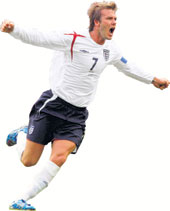 |
| STAR VALUE: David Beckham celebrates after scoring a goal; (below) his wife Victoria |
 |
It is a long way off from Gelsenkirchen in Germany to Calcutta. But the result of a recent soccer match between England and Portugal is being deeply mourned by members of the Natundal Sporting Club. England has been defeated, and so have the boys from Sovabazar in north Calcutta.
The World Cup has lost its shine: David Beckham has said goodbye.
For some football lovers, soccer is no fun without the English captain and his whirling free kicks. “We are really disappointed that we will not enjoy his presence in the World Cup any more,” says an anguished Amalesh Saha, president of the club.
But Beckham ? star or meteor, depending on how you look at him ? continues to rule. Some, like Saha, can’t come to terms with the fact that he is bowing out as captain. Some others, like former Indian football captain Chuni Goswami, think Beckham is stepping down not a moment too soon. “I can only say that he should have retired earlier,” sniffs Goswami, who holds that Beckham was never a complete footballer.
Demigod to some, an over-hyped footballer to others ? that’s David Beckham for you. The 31-year-old blond midfielder’s exploits may have made him an instantly recognisable brand name in the United Kingdom, but he is quite a cult figure in Calcutta as well.
A ten-year-old football fan can recite Beckham’s history with eyes closed. Married to the equally glamourous Victoria ‘Posh’ Adams, formerly a member of the popular band Spice Girls, David Robert Joseph Beckham was born in Leytonstone in East London. Father Ted, a kitchen fitter, and mother Sandra, a hairdresser, were die-hard Manchester United supporters. Young David played a mean ball, and the great Bobby Charlton accepted him in a soccer school in Manchester. Somewhere down the line Manchester United coach Alex Ferguson spotted Beckham’s talent. And it didn’t take long for Beckham to don the English jersey.
From his first appearance for the team in a match against Moldova in 1996 to Germany a decade later, Beckham has been an eyeball catcher. Not surprisingly, Beckham ? who earns ?4 million from his club, Real Madrid ? is the best-paid footballer in the world.
In 2004, his company, Footwork Productions, earned ?10.5 million ? after tax. Brazilian striker Ronaldo, with a commercial income of ?9 million, is the only other player in the world earning more than ?5 million in sponsorships.
Beckham continues to rule the market, even though his own career has been somewhat rocky. But despite tales of Beckham’s infidelity making tabloid headlines (former British Independent MP Martin Bell famously remarked; “We might as well have a newspaper called the Daily Beckham”), the footballer is the king of sponsorship. Among his sponsors are Adidas (?3 million), Gillette (?2.5 million a year), Motorola (?2.5 million a year) and Pepsi (?2 million a year).
But his roller-coaster presence on the field has not been without controversy. He was dropped for the first two matches for England in the 1998 World Cup after team manager Glenn Hoddle accused him of not concentrating on the game. But Beckham rose to the occasion in the third match, scoring from a long range free kick in England’s 2-0 victory over Colombia. However, his triumph was shortlived ? and he was shown a red card in a match against Argentina. England’s subsequent elimination from the World Cup made him a target of criticism at home, with his effigies hanging outside London pubs and cartoons depicting his face as the centre of dartboards.
That didn’t stop Beckham, though ? nor did it affect his legion of fans. “The Beckham magic principally lies in the fact that he is one of the most amazing players in dead ball situations,” says Shyam Thapa, former East Bengal player and coach. “Whether it is club football or international matches, he is deadly in his accuracy.” Thapa also feels that he has the ability to quickly turn around the fortunes of a team.
Many also believe that criticism has actually helped build his larger-than-life image. Satyajit Chatterjee, a former captain of the Indian football team, holds that the media was instrumental in the making of the Beckham myth. “There is no doubt that he is a good foootballer but he is an overrated player and the limitations in his game become apparent against good teams,” he states. Beckham, he points out, cannot really run fast and has difficulty in scoring in one-to-one situations.
Former Indian Olympic football captain P. K. Banerjee feels that Beckham’s unwillingness to get involved in skirmishes near the penalty zone limits his effectiveness as a player. “He is not an all-round footballer,” he says.
Limitations however have not prevented him from accomplishing glories on and off the field. He was part of the Manchester United team that won the treble honours ? the Premier League, FA Cup and Champions League, a unique feat in English football. There is a Beckham waxwork at Madame Tussaud’s and a move is on to have his statue erected at Trafalgar Square.
His fans in Calcutta wouldn’t mind a statue in the city either. Says Santanu Das, a member of the Sreebhumi Sporting Club in east Calcutta, who has changed his hairstyle to match Beckham’s: “He has enormous presence and I like the Hindi tattoo of Victoria on his hand.”
His views are shared by Ganesh Halui, a hawker at the Maidan market. “I obtained several England jerseys keeping his popularity in mind. The jerseys were selling well till England crashed out of the World Cup,” he regrets.
What next for Beckham? A tearful Beckham has bid farewell to the English captaincy after England’s defeat to Portugal. Will he, sooner or later, bid farewell to football as well? Says Amalesh Saha, “For the sake of football and fans like us, I hope he keeps playing. But I am not holding my breath.”










